Day 1 - IPC Plenary 2018 - Open Meeting - continued (3/2/2018)
Wednesday 24th January 2018
Day one of the IPC Plenary. Today it all starts with the Open Meetings. This is the opportunity to hear what changes are proposed by all the various committees and working groups. I will try to give a summarised report at the end of each session. We will be following the Agenda and Annexes etc. that are published on this website under IPC Meetings, Sofia, 2018.
The meeting was opened by the dignatories from Bulgaria who welcomed all the delegates representing 40 countries and in all about 100 people present. Mr. Kraskmir Velcher, Member of Parliment; Mrs. Jordanka Fandakova, Mayor of Sofia; General Major Yavor Mateev, General, Special Forces and Colonel Nevyana Miteva, the Director of Sport in the Ministry of Defence.
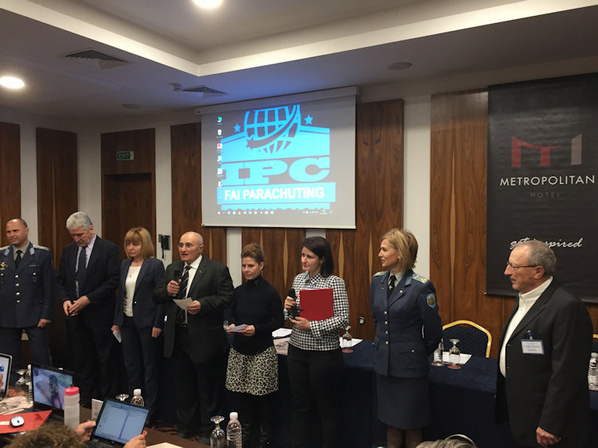 |
| Angel Staminov introducing the special dignatories prior to the start of the Open Meetings |
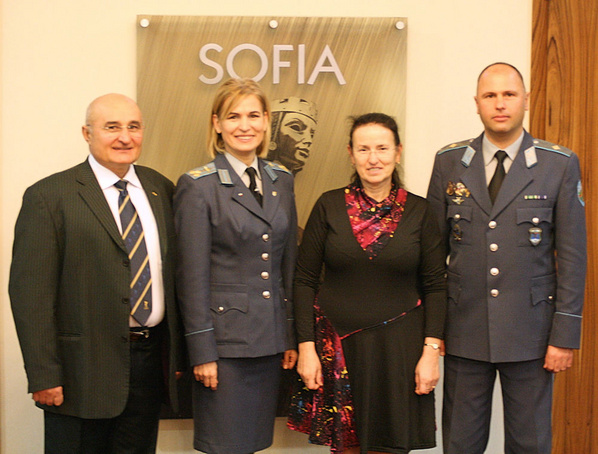 |
| L-R: Angel Staminov (Organiser), Colonel Nevyana Miteva, Ani Staminova (Organiser), General Major Yavor Mateev |
Whilst the IPC President, Dr. Rainer 'Exi' Hoenle took coffee with the 'officials', Patrice Giradin, 1st Vice-President of IPC took the chair and started the meeting. He opened with talking about the World Air Games. Turkey has come forward and have had several meetings with the FAI and both Patrice and Exi have visited Turkey to work towards the next WAG. The date has been agreed - last two weeks of September 2020 - the format of competition still has to be finalised. Patrice spoke very passionaltely about the opportunity this presents to IPC to perhaps rethink the type of competition. Turkey wants a BIG competition and if the bid from Russia is approved for the Mondial, there will only be one month between our standard World Championships and if we then ran a WAG using the same format it could undermine the value of the Champions who had won during the Mondial. He appealed to the Chairs present to look with their committees at different competition formats and use this opportunity to look with new eyes at new formats, new competitions.
Exi returned to the meeting at this point and invited Markus Haggeney from the FAI to speak on the latest with the World Games. Markus said how happy he was with the World Games that had taken place in Poland this year, but would leave Elisabet Mikaelsson to cover it in her report.
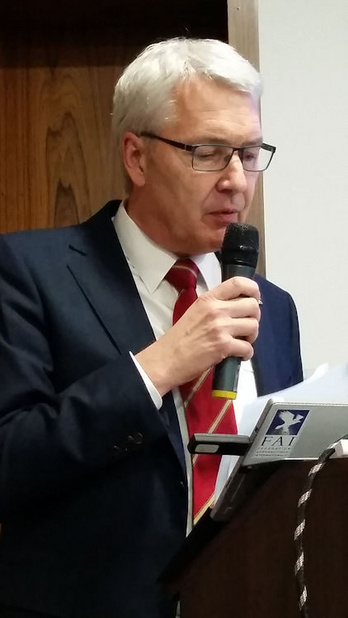
The next World Games will be held in Birmingham, Alabama, USA July 2021 and the FAI has finalised with the organisers the three air sports. Canopy Piloting is at the top of the list, with Drone flying and Para motoring, which was shown in Poland to be good in a confined environment. Other air-sports are too difficult. Exi says that there has been discussion about building a Tunnel and it is believed that one is planned in the Birmingham area, although this normally has a 6 - 8 years lead time.
Exi then spoke about Indoor Skydiving and the speed in which it is growing and also compared it with the explosive growth of drone flying and look to copy the development of a world series type of competition. However he feels we need to look at the name we use for our organisation to incorporate the word 'skydiving' to represent a major part of our sport. He asked delegates to think about this issue, he would propose it be considered for inclusion on the Agenda by a 2/3rd majority to change from International Parachuting Committee (IPC) to International Parachuting and Skydiving Committee (IPSC) plus World Indoor Skydiving (WIS).
In this opening statement Exi also talked about the development of Wind Tunnels, these are different from our traditional club, associations, NAC and FAI structure; Wind Tunnel owners are very much commercial operations and are not necessarily connected with NACs. This has come to light this year, as we have a bid from a Tunnel who has no connection with their NAC. The question arises as to the validity of the bid as the interpretation of the rule in relation is different between FAI and IPC, but the bid from Japan is not supported by the NAC of Japan which does not have a Parachuting section.
The issue for 2020 is the close proximity of the Mondial bid and the WAG. Exi undertook to speak with the organiser of the Mondial to see if they were prepared to change their dates to give a longer period between them.
He is concerned to see no bids in 2019 for FS, AE, CF or Speed, however there are still 2 days for a request for a 2/3rds majority to add new bids to the agenda. He explained the choice that is on the Agenda for support of Media representatives and will be put to the Plenary on Saturday. Exi also talked briefly about the new individual ranking lists that have been prepared in a different manner, taking account of all FCEs (including World Games and World Air Games). The Plenary will be asked to approve this new system on Saturday.
Next it was the turn of the French, headed by Patrice with the support of Gillian Rayner (FRA) and Domi Kiger to introduce the Olympic Dream. This had been the Dream of IPC for many, many years with highs and lows but the opportunity presented by the French and Paris 2024 is the closest we have come to an open window.
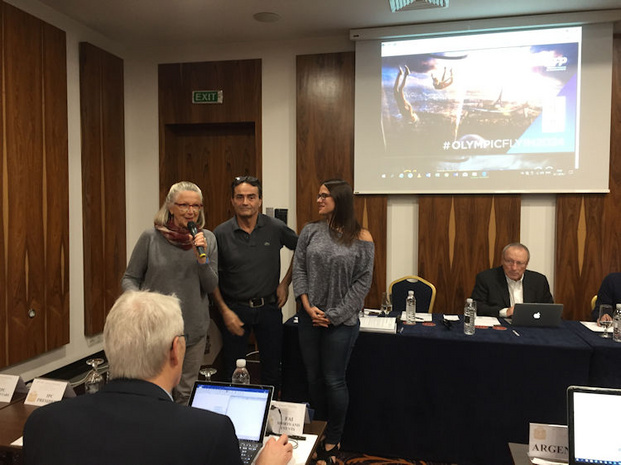
The combined presentation was passionately made and timelines and planning were explained fully - this also related to the various future bids for competitions to be hosted in France between now and the actual Olympics. The French have presented bids to host an Indoor Skydiving FCE 2019 and Canopy Piloting FCE in 2020, as these are the two disciplines which are being presented for inclusion in the Olympics. This is to show the Olympic Committee what will take place at the event, and to show the level of participation internationally, and France is looking for support from the Plenary for their bids.
Gillian presented the brochure that the FFP has put together which is aimed, not at Skydivers, but at the general public. She explained that the are using the history of parachuting as the French believe the first Parachute jump was made in Paris and so this is full circle - also the tunnel is being built on the site of the Olympic Park.
There was very strong support from all the Delegates. Patrice said that we must keep hold of this opportunity to enter the Olympic window and if Paris is unsuccessful, then we move onto Los Angeles 2028.
It was then the turn of the Technical and Safety Committee and Gustavo Eduardo Reyes (ARG) to bring us up to date with their important work. This year they had been let down by the USB stick provision and so the annual report was circulated to all delegates and was placed on the Cloud and will be available via this Website. This year, for the first time they have introduced the statistics on Parachuting Aircraft Incidents. There was a question from the floor regarding the inclusion of incident statistics from Indoor Skydiving. Liam McNulty (IRL) explained that initial contacts with Tunnel Owners revealed a reluctance to give information on tunnel time and also that 'incidents' tended to be very minor. There were no further questions.
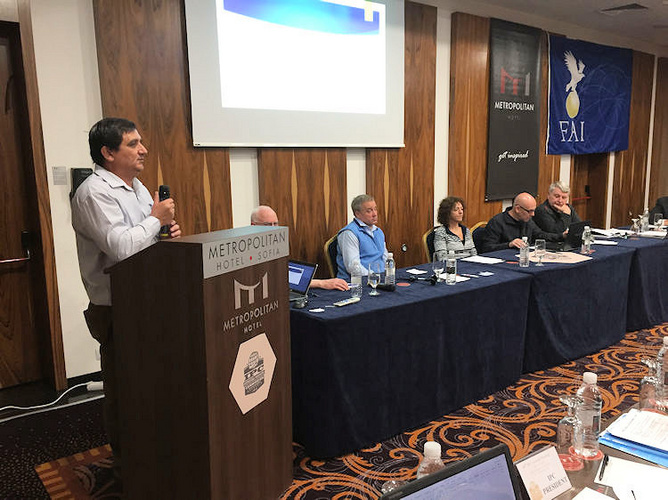
The Plenary meeting did not end there - I have to apologise - due to my duties as Recording Secretary I have not been able to update the daily diary although I have taken notes and pictures. Once Sunday is over I will finalise all the reports for those who normally follow what I write. I can only say sorry.
I'll be back with the news at the end.
Susan Dixon, 26 January 2018
It is now 31 January 2018 and I am back in France and can fill in the following days of the Plenary.
Next to take the microphone was Peter Pfalzgraf (GER), Finance Secretary. He started by publically apologising to Gail Bradley (AUS) for his comments in his report (circulated with the Agenda papers), saying that there had been a misunderstanding between them and he now realised that what he had written was wrong. He explaining he had only taken on the roll two years ago as no one had stepped forward and he did so on the understanding that there was not a lot of work involved. His predecessor had told him simply to follow the regulations in dealing with claims - as if it were his own money and this he had done.
To simplify procedures he had introduced new claim forms - as fillable PDFs which had resulted in fewer errors if the claimant had filled it in correctly (bank details). At least there had been no errors due to misreading the information. The IPC continues to be restricted in what they can actually do with our 'own' account other than view it. Claims are paid quickly if an IBAN can be used, but for other currency transactions Western Union is utilised by FAI and this brings about a longer timescale in refunding. He apologised for the one time he had failed to process a claim and only realised when he was reminded. Dealing with the FAI Finance system still remains unclear and is not easy.
Peter proposed to invite Richard 'Buzz' Bennett to talk about the cash flow position that the FAI was in which he, Buzz, had gleened from studying the FAI Balance Sheet produced for the General Conference and thought was very much of interest to the IPC and the Plenary.
Peter then put up onto the screen and commenced to talk through the figures for 2017 in relation to the budget and actual spend. He was interupted with a question from the floor from Doriz Merz (SUI) complaining that it was not possible to see from the back of the room, and had these documents been circulated so that Delegates could consult them. She also asked about a statement in the report produced by Peter about his proposal to introduce a new maximum payment for intercontinental payments. This proposal was based on a couple of claims that had been received just over the limit and he stated that the President had authorised the payment of them. This was against the finance reinbursement rules and she wanted an explanation. Richard 'Buzz' Bennett also stated that the Working Group had not been consulted at all on this matter.
At that point it was decided to adjourn the presentation until later in the Open Meetings in order for the necessary documents to be circulated to all Delegates and they had time to consult them.
We then moved to the latest of our Competition Disciplines, Wingsuit Flying. John Smyth (GBR), committee chair, came to the microphone and read through his report from the Agenda papers. He explained that there had been so many minor changes, word clarification, 'housekeeping' that he was not going to list them individually but present them as a new set of rules using the accepted colour code: Red - deleted - Blue - new - Black - original. He started by thanking his committee for their work over the year and introduced its new Chair, Dennis Werenskiold from Denmark. He spoke about the long and interesting Competitors' Meeting that had taken place in Nevada at the end of the 2nd FAI Wingsuit Flying World Cup. Two major items had been addressed by the committee. In Performance Flying, the actual flight path now had a clearer definition and the penalty structure had been reviewed and changed with a view to keeping the safety aspect, but not making it so devastating for a minor infringement. The main discussion though had been with Acrobatic Flying. The competitors wish to move to an Altitude Window rather than a performance time.

The committee believed that this is the way for the future, but 2018 is a World Championship year and the policy of IPC is not to introduce major rule changes in a WPC year; and this would be a major rule change which would penalise teams that have been training under the existing rules. However it would be introduced for 2019. This would also give time for the Scoring System and devices to be finalised. During this year a survey would be conducted of the Wingsuit community to finalise exactly how this desire could/would be implemented.
There was a question from the floor about the new tunnel in Sweden - perfect for Wingsuit flying. John said the committee is very excited about its existence and was looking at using the tunnel to develop training and Wingsuit Acrobatic devices, but there was nothing official yet.
We then broke for a lunch break before preparing for the afternoon session. Back into the main room at 14.30 to continue with Para Ski and the chair, Michael Egger (AUT). Michael introduced the members of his committee and thanked them for all their work during the year. He also thanked the Organiser for their excellent organisation of the World Championships in Austria during 2017. He also spoke about this year's Para-Ski World Cup Series, the first competition had a bad weather start but managed to be completed and they were looking forward to the second competition in Italy. The Italian delegate, Sandro Gargini, said how happy he was to welcome back Para-Ski to Italy after their successful FAI World Championships in 2010. There were no major rule changes proposed, just clarification on what counted for the medal ranking and also the team skiing calculation; half points - half the maximum.
Michael then spoke about the ranking system they had developed for Para-Ski in that it also included 2nd Category Events so that it could include the World Cup Series giving a more meaningful table. He then moved to a more contentious subject. At the last World Championships two NACs had refused to allow their competitors to enter and compete, due to internal national reasons. He felt this was very unfair on the individual competitors and asked that this attitude STOP! He was very happy to report though that CISM had adopted Para-Ski as a discipline and would include it in their competition programme. He ended with his usual plea for future bids.
We then moved to our oldest discipline Accuracy Landing and Freefall Style and the chair of this committee, Gunter Berendt (GER). Gunter introduced his committee and thanked them for their work this year. He said his report on the World Cup in Montenegro was in the agenda documents, but he reported that although the competition had been beset with problems, they had a competition and had been able to award medals. Doris Merz Hunziker (SUI) asked the question from the floor, as in line with Gunter's report and that of the Jury President and the problems they outlined, why had the Bureau agreed to refund the deposit to the organiser? Dr. Rainer 'Exi' Hoenle explained that neither report, although critical had recommended that the deposit be withheld. For the Bureau the existing rules are very clear, there was no material reason not to refund the deposit to the organiser at the successful end of the FCE.
Jiri Blaska (CZE) also asked, from the floor of the meeting, why his proposal to reconsider the use of camera at the target not been adopted. He had introduced this as a judging aid and could see no reason for its rejection. Gunter explained that this had been discussed at length two years ago, and a decision taken then by the Plenary not to proceed with cameras at the target. He saw no reason to change that conclusion - on the grounds that they cameras introduced another layer of decision-making to the equation and were not an aid for judges or competitors.
It was now the turn of Alberto Martin Paracuellos, Chair of the Canopy Piloting committee. Alberto said that the reports for 2017 were contained in the papers circulated before the meeting. He also confirmed that Poland had agreed to change the competition structure to include Freestyle at this year's World Championships and there would be 12 rounds in total, 3 for each event. The bid had been adjusted to include this change so that a team could decide to enter all 4 disciplines and do 12 rounds, or only the classic 3 and do 9, or Freestyle only and do 3. This will be put to the Plenary to be voted on. He also wanted to advise the attendees that there was a Bid for a Canopy Piloting World Cup in South Africa for 2019 and would require a 2/3rds majority when put to the Plenary on Saturday. He confirmed that the application fee had been paid. Russia had a bid on the table (included in the agenda documents) for a Mondial in 2020 and they wished to include Canopy Piloting. They confirmed that the pond was currently under construction and they would show pictures of it in their presentation. There was also a bid from France for a Canopy Piloting World Championships in 2020 which would be considered if the Mondial bid from Russia was not accepted.
Alberto then talked about the FAI Swoop Freestyle World Championships, the first of which took place in Copenhagen in August. At the last Plenary he had mentioned, in the open meeting, a possibility of developing a World Series, but that at that time he was covered by a confidentiality agreement, and it was very early stages. Along with the FAI and George Blythe and his partner an agreement had been reached to allow the title of FAI Swoop Freestyle World Championships to the swoop competition in Copenhagen harbour, which had already been in place for 3 years. IPC was involved for its expertise in terms of rules, regulations, judges and personnel. A selection process had been agreed based on an individual ranking list (organised on the same basis as our existing Ranking Lists) and it had been a very successful competition. He then gave the place at the front of the Plenary to George Blythe who made an excellent presentation of where he and his partner had come from, and what they had achieved before approaching FAI and IPC for support going forward. The first World Championships had been a huge success with large audiences attending each day, and excellent live-streamed media coverage. His video was exciting to watch. There was discussion from the floor, all in support of the final object, but critical of the way it had come about. Alberto tried to explain that it was a question of going with something good whilst the chance was there, or waiting and losing the opportunity to be involved. The results the Plenary had just viewed spoke for themselves. There is already a competition in Copenhagen planned for 24/25 August 2018 and discussions underway with other city hosts to commence a World Series.
Ron Miasnikov (ISR), Chair of the Artistic Events committee then introduced the last session of the day. Again Ron thanked her committee for the work they had done during the year. She also referred the Plenary to her reports contained in the Agenda papers. Saarlouis, Germany had been a good event with a small number of competitors but unfortunately the bad weather had meant it was impossible to complete all rounds of the event. She also commented about the problems presented by the need to share their judging room with another discipline and in fact it had not worked and Canopy Formation had to move elsewhere. She was critical of this decision by the organiser.
Following the Indoor Skydiving World Championships in Canada there was serious discussion within her committee about the unsportsman-like behaviour by both a competitor and the parent of a competitor, including storming in and out of the judging room and accusing judges of lack of impartiality. This is a situation she felt that the Bureau and Plenary needed to address. It was pointed out that there was no mention of these incidents in the reports submitted by the officials present. She asked that the report from the Organiser which had been sent to her, be circulated to all Delegates. However, as this report contained unconfirmed, unqualified allegations of a quite serious nature the circulation was withdrawn and it was suggested that the organiser be contacted to qualify their statements. However there was total support from the open meeting that behaviour of this type should not be tolerated and is catered for in our rules.
Before the Delegates disappeared to the bar and restaurant for the evening, Russia showed their promotional video to persuade the Plenary to vote for their Mondial Bid for 2020 for Tanay in Siberia. Because of the possibility of the FAI being successful in their plans for the World Air Games in Turkey 2020, Russia agreed to change the proposed date of their competition to the 1 -14th August so that there was not a clash between the two competitions for elegible competitors. Denis Sviridov assured the delegates that the accommodation provided on site would be more than enough to cover all entrants and officials. He also explained that they had already negotiated with the necessary official channels to be able to offer a special Sport Visa Passport system which was being introduced by Russia for the Football World Cup, it would be simple to apply for and obtain with none of the problems experienced in the past with previous competitions in Russia.
He showed pictures of the pond and its location and answered questions on size. He confirmed that whilst it was being built they were in consultaiton with the committee to ensure it met the required standards. When asked about the problems caused by running multi-disciplines on the same drop zone with landing areas, he confirmed that it was a very large landing area, and there were currently 4 separate landing zones on the airfield. He was also asked about the proposed scheduling of the various disciplines as with the number of disciplines if they all ran over the whole 14 days it could mean competitiors were only geting one jump a day, or for some disciplines every other day. Denis stated if they were successful in their bid they would consult with committee chairs and the FAI Controller to work an acceptable schedule and present it to the Plenary next year.
The very last item was notification to the Delegates that Letters of Intent had been received from Portugal and the USA, with Portugal to host Artistic Events and Speed Skydiving World Cups and the USA for Formation Skydiving and Artistic Events in 2019 and once the bids were received by the Recording Secretary they would be circulated to all Delegates.
The discussions, lobbying and story telling continued late into the night.

